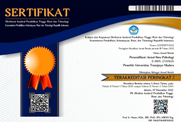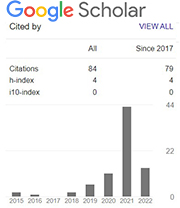Meta-Analysis Study: Effectiveness of Play Therapy to Reduce Children's Aggressiveness
Abstract
Keywords
Full Text:
PDFReferences
Ahn, E., & Kang, H. (2018). Introduction to systematic review and meta-analysis. Korean Journal of Anesthesiology, 71(2), 103–112. https://doi.org/10.4097/kjae.2018.71.2.103
Akbari, A., Monirpour, N., Mirzahosseini, H., Branch, Q., & Branch, Q. (2021). The effectiveness of parent-based play therapy on aggression and symptoms of oppositional defiant disorder. Quarterly Journal of Child Mental Health, 8(1).
Allahi, M. (2014). The effectiveness of play therapy on aggressiveness and anger control of children in centers of preschool children city of yasouj ( Iran ). Indian Journal of Fundamental and Applied Life Sciences, 1332–1337.
Allen, J. J., & Anderson, C. A. (2017). Aggression and violence: definitions and distinctions. The Wiley Handbook of Violence and Aggression, 1–14. https://doi.org/10.1002/9781119057574.whbva001
Bita Sarpoulaki, & Parisa Kolahi. (2016). Role of play therapy on aggression and learning disabilities in students: a quasi-experimental design. International Journal of Indian Psychology, 3(4). https://doi.org/10.25215/0304.021
Borenstein, M., Hedges, L. V., Higgins, J. P., & Rothstein, H. R. (2021). Introduction to meta-analysis (J. Wiley & Sons, Eds.).
Borenstein, M., Hedges, L. V., Higgins, J. P. T., & Rothstein, H. R. (2009). Introduction to meta-analysis. In An Introduction to Information Processing (first edit). WILEY. https://doi.org/10.1016/b978-0-12-209005-9.50005-9
Bosco, F. A., Aguinis, H., Singh, K., Field, J. G., & Pierce, C. A. (2015). Correlational effect size benchmarks. Journal of Applied Psychology, 100(2), 431–449. https://doi.org/10.1037/a0038047
Chotim, M., Affifah, D. R., & Dewi, N. K. (2012). Mengurangi Tingkat Agresivitas Anak Usia TK melalui Terapi Bermain (Play Therapy). Counsellia: Jurnal Bimbingan Dan Konseling, 2(2).
Ellis, P. D. (2010). The Essential Guide to Effect Sizes: statistical power, meta-analysis, and the interpretation of research result. In The Essential Guide to Effect Sizes. Cambridge University. https://doi.org/10.1017/cbo9780511761676
Fitria, N., & Meiyuntariningsih, T. (2019). Pengaruh token ekonomi untuk mengurangi agresivitas pada anak. Seminar Nasional Multidisiplin, 258–264.
Fritz, C. O., Morris, P. E., & Richler, J. J. (2012). Effect size estimates: current use, calculations, and interpretation. Journal of Experimental Psychology: General, 141(1), 2–18. https://doi.org/10.1037/a0024338
Goudarzi, K., Meridian, S., & Roozbahani, M. (2019). Determining the Effectiveness of Game Therapy on Aggression, Stress and Anxiety in Children. Journal of Motor and Behavioral Sciences, 2(2), 116–125.
Iswinarti, I., & Hidayah, N. (2020a). Empathy enhancement through group play therapy to reduce aggressive behavior. Jurnal Konseling Dan Pendidikan, 8(3), 151. https://doi.org/10.29210/147900
Iswinarti, I., & Hidayah, N. (2020b). Empathy enhancement through group play therapy to reduce aggressive behavior. Jurnal Konseling Dan Pendidikan, 8(3), 151. https://doi.org/10.29210/147900
Jarareh, J., Mohammadi, A., Nader, M., & Moosavian, S. A. (2016). The impact of group play therapy on creativity and control of aggression in preschool children. Cogent Psychology, 3(1), 1264655. https://doi.org/10.1080/23311908.2016.1264655
Kasmaei, S. K., & Asghari, F. (2017a). Comparative study of the effects of narrative therapy and play therapy by group approach on inhibiting impulsivity, reducing aggression and increasing interpersonal relations. World Family Medicine Journal: Incorporating the Middle East Journal of Family Medicine, 15(4), 24–33.
Kasmaei, S. K., & Asghari, F. (2017b). Play therapy by group approach on inhibiting impulsivity, reducing aggression and increasing interpersonal relations. World Family Medicine/ Middle East Journal of Family Medicine, 15(4), 24–33.
Koç, V., & Kafa, G. (2019). Cross-Cultural Research on Psychotherapy: The Need for a Change. Journal of Cross-Cultural Psychology, 50(1), 100–115. https://doi.org/10.1177/0022022118806577
Kyes, R. L. (2015). APA second edition dictionary of psychology. In Dictionary of the old low and central Franconian psalms and glosses. American Psychological Association. https://doi.org/10.1515/9783111704227.1
Marini, T., Sholihah, M., & Nusir, L. (2024). Studi Kasus Perilaku Agresif Pada Anak Usia Dini. Journal Buah Hati, 11(1), 15–26.
Mark W. Lipsey, D. W. (2001). Practical meta analysis overview. Applied Social Research Methods Series.
Musslifah, A. R., Cahyani, R. R., Rifayani, H., & Hastuti, I. B. (2021). Peran Pola Asuh Orang Tua Terhadap Perilaku Agresif Pada Anak. Jurnal Talenta Psikologi, XVI(2), 5–21.
Page, M. J., McKenzie, J. E., Bossuyt, P. M., Boutron, I., Hoffmann, T. C., Mulrow, C. D., Shamseer, L., Tetzlaff, J. M., Akl, E. A., Brennan, S. E., Chou, R., Glanville, J., Grimshaw, J. M., Hróbjartsson, A., Lalu, M. M., Li, T., Loder, E. W., Mayo-Wilson, E., McDonald, S., … Moher, D. (2021). The PRISMA 2020 statement: An updated guideline for reporting systematic reviews. The BMJ, 372. https://doi.org/10.1136/bmj.n71
Parfilova, G. G. (2016). Managing and preventing aggressiveness in primary school children. International Electronic Journal of Mathematics Education, 11(4), 921–931.
Porter, M. L., Hernandez-Reif, M., & Jessee, P. (2009). Play therapy: A review. Early Child Development and Care, 179(8), 1025–1040. https://doi.org/10.1080/03004430701731613
Post, C., Sarala, R., Gatrell, C., & Prescott, J. E. (2020). Advancing theory with review articles. Journal of Management Studies, 57(2), 351–376. https://doi.org/10.1111/joms.12549
Pramudianti, D. T. (2019). Efektivitas Play Therapy Berbasis Origami Untuk Mengurangi Perilaku Agresif Pada Anak Usia Dini. Universitas Muhammadiyah Magelang.
Pratiwi, D. A. (2023). Game Play Therapy Dengan Media Permainan Tradisional untuk Meningkatkan Kontrol Diri Pada Anak Dengan Perilaku Agresi. Universitas Muhammadiyah Malang.
Puhan, M. A., Soesilo, I., Guyatt, G. H., & Schünemann, H. J. (2006). Combining scores from different patient reported outcome measures in meta-analyses: when is it justified? Health and Quality of Life Outcomes, 4(1), 94. https://doi.org/10.1186/1477-7525-4-94
Purwati, A. H. AL., & Qomariyah, L. (2019). The effectiveness of play therapy and role playing in reducing children’s aggressive behavior. International Journal of Innovation, Creativity and Change, 7(1), 209–222.
Putri, N. D. P., & Cahyanti, I. Y. (2021a). Terapi Bermain untuk Menurunkan Perilaku Agresi pada Anak-anak di Pesantren X, Surabaya. Jurnal Penelitian Pendidikan, Psikologi dan Kesehatan (J-P3K), 2(3), 259–267. https://doi.org/10.51849/j-p3k.v2i3.121
Putri, N. D. P., & Cahyanti, I. Y. (2021b). Terapi Bermain untuk Menurunkan Perilaku Agresi pada Anak-anak di Pesantren X, Surabaya. Jurnal Penelitian Pendidikan, Psikologi Dan Kesehatan (J-P3K), 2(3), 259–267. https://doi.org/10.51849/j-p3k.v2i3.121
Ray, D. C., Blanco, P. J., Sullivan, J. M., & Holliman, R. (2009). An exploratory study of child-centered play therapy with aggressive children. International Journal of Play Therapy, 18(3), 162–175. https://doi.org/10.1037/a0014742
Reef, J., Diamantopoulou, S., van Meurs, I., Verhulst, F. C., & van der Ende, J. (2011). Developmental trajectories of child to adolescent externalizing behavior and adult DSM-IV disorder: results of a 24-year longitudinal study. Social Psychiatry and Psychiatric Epidemiology, 46(12), 1233–1241. https://doi.org/10.1007/s00127-010-0297-9
Riley, R. D., Higgins, J. P., & Deeks, J. J. (2010). Interpretation of random effects meta-analyses. Bmj, 342.
Sarpoulaki, B., & Kolahi, P. (2016a). The Effectiveness of Play Therapy on Aggression Index, a Clinical Trial. Imperial Journal of Interdisciplinary Research (IJIR), 2(7), 1308–1312.
Sarpoulaki, B., & Kolahi, P. (2016b). Role of play therapy on aggression and learning disabilities in students: a quasi-experimental design. IJIP. In. The International Journal of Indian Psychology, 3(4), 12–22.
Shelby, L. B., & Vaske, J. J. (2008). Understanding Meta-Analysis: A Review of the Methodological Literature. Leisure Sciences, 30(2), 96–110. https://doi.org/10.1080/01490400701881366
Soltani, M., & Farhadi, H. (2021). The effectiveness of play therapy based on the relationship parent child (filial therapy) on addiction to computer games, and aggression in preschoolers. Knowledge & Research in Applied Psychology, 22(8), 13–21.
Teimourian, S., Mirzaei, H., Pishyare, E., & Hosseinzadeh, S. (2020a). Effect of group play therapy on emotional/behavioral problems of children with attention deficit hyperactivity disorder Aged 6-12 years. Journal of Rehabilitation, 21(3), 390–405. https://doi.org/10.32598/rj.21.3.3158.1
Teimourian, S., Mirzaei, H., Pishyare, E., & Hosseinzadeh, S. (2020b). Effect of Group Play Therapy on Emotional/Behavioral Problems of Children With Attention Deficit Hyperactivity Disorder Aged 6-12 Years. Journal of Rehabilitation, 21(3), 390–405. https://doi.org/10.32598/RJ.21.3.3158.1
Vergunst, F., Tremblay, R. E., Nagin, D., Algan, Y., Beasley, E., Park, J., Galera, C., Vitaro, F., & Côté, S. M. (2019). Association Between Childhood Behaviors and Adult Employment Earnings in Canada. JAMA Psychiatry, 76(10), 1044. https://doi.org/10.1001/jamapsychiatry.2019.1326
Wilson, B. J., & Ray, D. (2018). Child‐Centered Play Therapy: Aggression, Empathy, and Self‐Regulation. Journal of Counseling & Development, 96(4), 399–409. https://doi.org/10.1002/jcad.12222
Yaseminejad, P., & Solgi, Z. (2018). Effectiveness of Play Therapy Based on Cognitive Behavior Therapy on Physical Relational and Verbal Aggression of Preschool Children. International Journal of Applied Behavioral Sciences, 5(2), 9–15.
DOI: https://doi.org/10.21107/personifikasi.v16i1.27518
Refbacks
- There are currently no refbacks.
Copyright (c) 2025 Esa Arsyiatul Alfath, Riki Zalki, Tutut Chusniyah

This work is licensed under a Creative Commons Attribution 4.0 International License.


Personifikasi by Universitas Trunojoyo Madura is licensed under a Creative Commons Attribution 4.0 International License.










